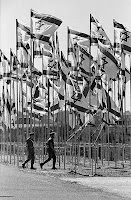Five Books of Israel
This evening the State of Israel, the reshit tsmiḥat g’ulateynu, will celebrate its sixty-second anniversary. Although some readers of this blog may be hostile  to the very idea of a Jewish state, others might like to acquire a Pentateuch of the best Israeli fiction.
to the very idea of a Jewish state, others might like to acquire a Pentateuch of the best Israeli fiction.
Israeli writers are usually divided into the Dor Baarets (the Native Generation, to distinguish it from earlier Hebrew-language writers who immigrated to Palestine before Independence) and the Dor Hamedinah (the State Generation, a.k.a. the New Wave). While the first generation was nationalist in politics and realist in method, the second has been cooler and more reserved if not always post-Zionist in its political feelings and self-consciously influenced by international modernism.
Moshe Shamir’s King of Flesh and Blood (1958) is, according to the great critic Gershon Shaked, the “most solid achievement” of the first generation. It was released in London and New York in a translation by David Patterson. A historical novel set during the reign of a Hasmonean king in the second and first centuries B.C.E., Shamir’s book is an allegory in celebration of the War of Independence, “in which the author’s admiration for the fighters and the nation’s leaders,” Shaked says, “is projected onto the Hasmoneans.” Although I am a fervent Zionist, I confess that I have small desire to read Shamir’s book.
Although not technically a native, Aharon Megged (born in Poland in 1920 and brought to Palestine when he was five) is, to someone who knows very little of its work, the most interesting of the Native Generation’s fiction writers. His novel Foiglman (1987), published in a superb English translation by Marganit Weinberger-Rotman in 2003, tells what happens to a Yiddish poet and Holocaust survivor in the new state.
Outside of Megged, my literary tastes run to the fiction of the New Wave generation, no matter how much I wince at its politics. The four pillars of the generation are A. B. Yehoshua (b. 1936), Amos Oz (b. 1939), Meir Shalev (b. 1948), and David Grossman (b. 1954).
Oz, who is regularly mentioned as a candidate for the Nobel Prize, is hampered by never having written a clear-cut masterpiece. Perhaps the best of his books to read is The Hill of Evil Counsel (1976), a medley of three linked stories set in Jerusalem during the final days of the British Mandate. The problem (and logic) of the generational divide in Israeli culture is nicely summarized by this passage from the volume’s second story:
A. B. Yehoshua’s Mr. Mani (1990) also employs postmodern technique, narrating a family chronicle from the present into the distant past, although within each section of the novel Yehoshua almost writes like a realist. Tracing the (mis)fortunes of a prominent commercial Sephardic family back to the years before emigration to the Holy Land had even begun, the novel is intended as a reinterpretation of Zionism’s entire history. You can ignore Yehoshua’s disputable conclusions, however, and focus on the terrific portraits of the people.
Finally, there is Meir Shalev’s recent novel A Pigeon and a Boy (2006), with a title derived from a poem by Bialik. In all his fiction, Shalev expresses a dry-eyed nostalgia for a less complicated, less riven Israel. Although a typical Israeli Leftist, his fiction is innocent of his political clichés. As Ruth Margalit says in an excellent Haaretz review of his latest novel, A Pigeon and a Boy is based upon the ancient Jewish longing for home, which has only been deepened by the astonishing country the Jews have established in their ancient homeland.





7 comments:
I'm surprised you didn't mention Yaakov Shabtai's Past Continuous, which is considered by most Israeli critics, and writers (myself included) to be the best novel produced since the country's foundation, and is also the most strikingly Modernist achievement in Israeli Literature.
Didn’t need to mention it, SKA. You did so for me. Thanks!
Dr. Meyers,
The next time someone accuses you of allowing political views to shape your literary tastes, send them here.
I've only read Oz and Yehoshua (I agree wholeheartedly about Mr. Mani), and occasionally have wondered if their politics prevent them finding an audience among Jewish readers in the United States.
Out of curiosity, where does Appelfeld fit into this division of Israeli writers? Is he considered Dor Hamedinah?
Regards,
Yes: Appelfeld is “second generation,” and who does not adore his writing? But he is hardly a representative Israeli novelist. You would never recommend him to anyone who wished to understand the Israeli mind from the inside.
On the other hand, he is the single greatest Holocaust novelist ever.
Are you familiar with Ibis Editions?
An interesting little publishing house that focuses on "the Levant".
Unfortunate news.
Thought you might appreciate this story of the Great Israeli Sci-Fi masterpiece (which does not really exist):
http://www.tabletmag.com/jewish-arts-and-culture/149176/jacob-wallenstein-shay-azoulay
Post a Comment